英译散文张培基
- 格式:docx
- 大小:15.88 KB
- 文档页数:9
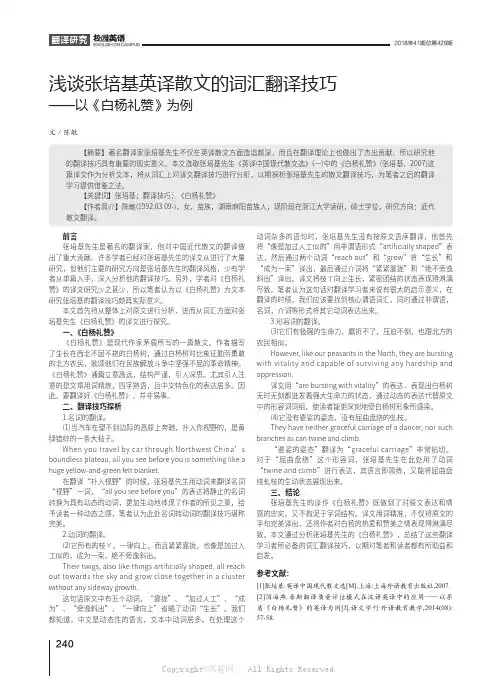
2402018年41期总第429期ENGLISH ON CAMPUS浅谈张培基英译散文的词汇翻译技巧——以《白杨礼赞》为例文/陈敏【摘要】著名翻译家张培基先生不仅在英译散文方面造诣颇深,而且在翻译理论上也做出了杰出贡献,所以研究他的翻译技巧具有重要的现实意义。
本文选取张培基先生《英译中国现代散文选》(一)中的《白杨礼赞》(张培基,2007)这篇译文作为分析文本,将从词汇上对译文翻译技巧进行分析,以期探析张培基先生的散文翻译技巧,为笔者之后的翻译学习提供借鉴之法。
【关键词】张培基;翻译技巧;《白杨礼赞》【作者简介】陈敏(1992.03.09-),女,苗族,湖南麻阳苗族人,现阶段在浙江大学读研,硕士学位,研究方向:近代散文翻译。
前言张培基先生是著名的翻译家,他对中国近代散文的翻译做出了重大贡献。
许多学者已经对张培基先生的译文从进行了大量研究,但他们主要的研究方向是张培基先生的翻译风格,少有学者从单篇入手,深入分析他的翻译技巧。
另外,学者对《白杨礼赞》的译文研究少之甚少,所以笔者认为以《白杨礼赞》为文本研究张培基的翻译技巧颇具实际意义。
本文首先将从整体上对原文进行分析,进而从词汇方面对张培基先生《白杨礼赞》的译文进行探究。
一、《白杨礼赞》《白杨礼赞》是现代作家茅盾所写的一篇散文。
作者描写了生长在西北不屈不挠的白杨树,通过白杨树对比象征勤劳勇敢的北方农民,歌颂他们在民族解放斗争中坚强不屈的革命精神。
《白杨礼赞》通篇立意高远,结构严谨,引人深思。
尤其引人注意的是文章用词精炼,四字熟语,且中文特色化的表达居多。
因此,要翻译好《白杨礼赞》,并非易事。
二、翻译技巧探析1.名词的翻译。
(1)当汽车在望不到边际的高原上奔驰,扑入你视野的,是黄绿错综的一条大毡子。
When you travel by car through Northwest China’s boundless plateau, all you see before you is something like a huge yellow-and-green felt blanket.在翻译“扑入视野”的时候,张培基先生用动词来翻译名词“视野”一词,“all you see before you”的表达将静止的名词转换为具有动态的动词,更加生动地体现了作者的所见之景,给予读者一种动态之感,笔者认为此处名词转动词的翻译技巧堪称完美。
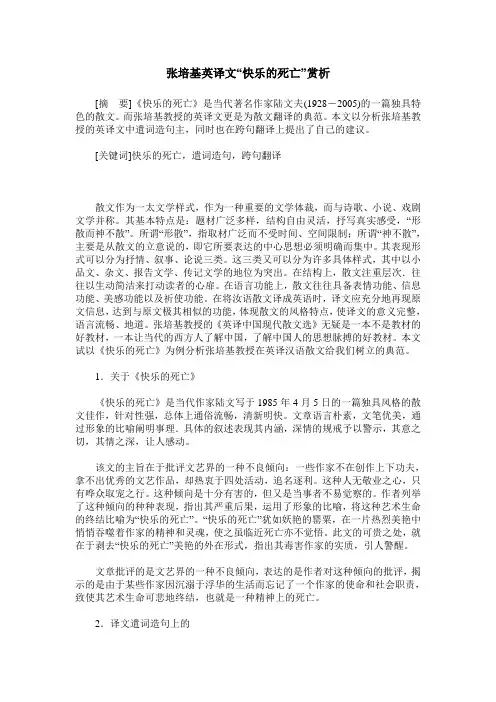
张培基英译文“快乐的死亡”赏析[摘要]《快乐的死亡》是当代著名作家陆文夫(1928-2005)的一篇独具特色的散文。
而张培基教授的英译文更是为散文翻译的典范。
本文以分析张培基教授的英译文中遣词造句主,同时也在跨句翻译上提出了自己的建议。
[关键词]快乐的死亡,遣词造句,跨句翻译散文作为一太文学样式,作为一种重要的文学体裁,而与诗歌、小说、戏剧文学并称。
其基本特点是:题材广泛多样,结构自由灵活,抒写真实感受,“形散而神不散”。
所谓“形散”,指取材广泛而不受时间、空间限制;所谓“神不散”,主要是从散文的立意说的,即它所要表达的中心思想必须明确而集中。
其表现形式可以分为抒情、叙事、论说三类。
这三类又可以分为许多具体样式,其中以小品文、杂文、报告文学、传记文学的地位为突出。
在结构上,散文注重层次.往往以生动简洁来打动读者的心扉。
在语言功能上,散文往往具备表情功能、信息功能、美感功能以及祈使功能。
在将汝语散文译成英语时,译文应充分地再现原文信息,达到与原文极其相似的功能,体现散文的风格特点,使译文的意义完整,语言流畅、地道。
张培基教授的《英译中国现代散文选》无疑是一本不是教材的好教材,一本让当代的西方人了解中国,了解中国人的思想脉搏的好教材。
本文试以《快乐的死亡》为例分析张培基教授在英译汉语散文给我们树立的典范。
1.关于《快乐的死亡》《快乐的死亡》是当代作家陆文写于1985年4月5日的一篇独具风格的散文佳作,针对性强,总体上通俗流畅,清新明快。
文章语言朴素,文笔优美,通过形象的比喻阐明事理.具体的叙述表现其内涵,深情的规戒予以警示,其意之切,其情之深,让人感动。
该文的主旨在于批评文艺界的一种不良倾向:一些作家不在创作上下功夫,拿不出优秀的文艺作品,却热衷于四处活动,追名逐利。
这种人无敬业之心,只有哗众取宠之行。
这种倾向是十分有害的,但又是当事者不易觉察的。
作者列举了这种倾向的种种表现,指出其严重后果,运用了形象的比喻,将这种艺术生命的终结比喻为“快乐的死亡”。
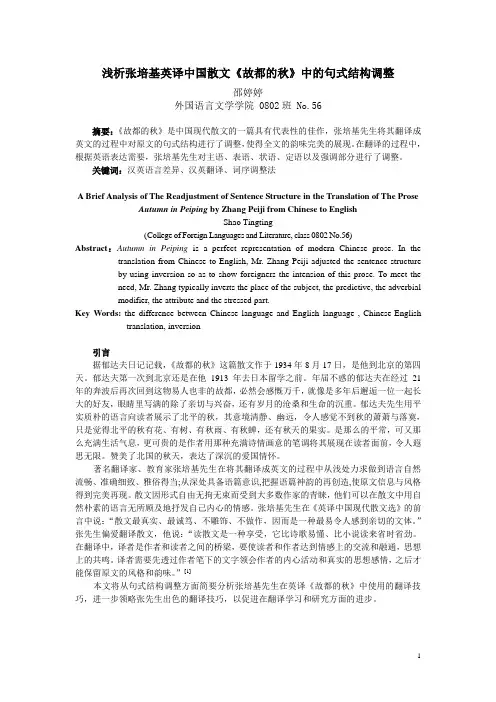
浅析张培基英译中国散文《故都的秋》中的句式结构调整邵婷婷外国语言文学学院 0802班 No.56摘要:《故都的秋》是中国现代散文的一篇具有代表性的佳作,张培基先生将其翻译成英文的过程中对原文的句式结构进行了调整,使得全文的韵味完美的展现。
在翻译的过程中,根据英语表达需要,张培基先生对主语、表语、状语、定语以及强调部分进行了调整。
关键词:汉英语言差异、汉英翻译、词序调整法A Brief Analysis of The Readjustment of Sentence Structure in the Translation of The ProseAutumn in Peiping by Zhang Peiji from Chinese to EnglishShao Tingting(College of Foreign Languages and Literature, class 0802 No.56)Abstract:Autumn in Peiping is a perfect representation of modern Chinese prose. In the translation from Chinese to English, Mr. Zhang Peiji adjusted the sentence structureby using inversion so as to show foreigners the intension of this prose. To meet theneed, Mr. Zhang typically inverts the place of the subject, the predictive, the adverbialmodifier, the attribute and the stressed part.Key Words: the difference between Chinese language and English language , Chinese-English translation, inversion引言据郁达夫日记记载,《故都的秋》这篇散文作于1934年8月17日,是他到北京的第四天。
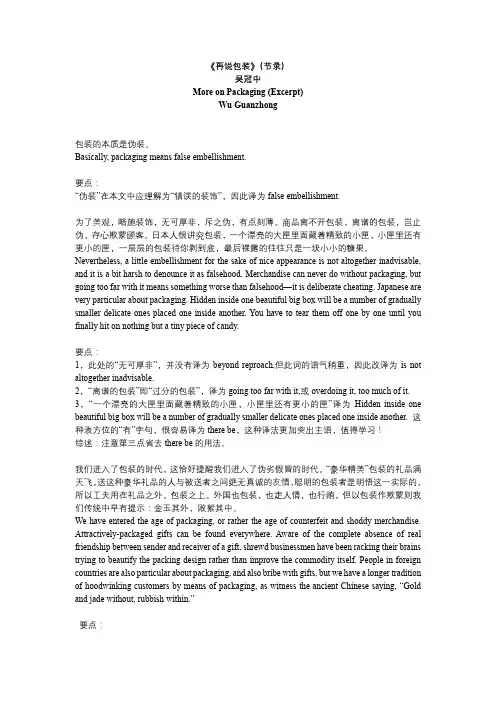
《再说包装》(节录)吴冠中More on Packaging (Excerpt)Wu Guanzhong包装的本质是伪装。
Basically, packaging means false embellishment.要点:“伪装”在本文中应理解为“错误的装饰”,因此译为false embellishment.为了美观,略施装饰,无可厚非,斥之伪,有点刻薄。
商品离不开包装,离谱的包装,岂止伪,存心欺蒙顾客。
日本人很讲究包装,一个漂亮的大匣里面藏着精致的小匣,小匣里还有更小的匣,一层层的包装待你剥到底,最后裸露的往往只是一块小小的糖果。
Nevertheless, a little embellishment for the sake of nice appearance is not altogether inadvisable, and it is a bit harsh to denounce it as falsehood. Merchandise can never do without packaging, but going too far with it means something worse than falsehood—it is deliberate cheating. Japanese are very particular about packaging. Hidden inside one beautiful big box will be a number of gradually smaller delicate ones placed one inside another. You have to tear them off one by one until you finally hit on nothing but a tiny piece of candy.要点:1,此处的“无可厚非”,并没有译为beyond reproach,但此词的语气稍重,因此改译为is not altogether inadvisable.2,“离谱的包装”即“过分的包装”,译为going too far with it,或overdoing it, too much of it. 3,“一个漂亮的大匣里面藏着精致的小匣,小匣里还有更小的匣”译为Hidden inside one beautiful big box will be a number of gradually smaller delicate ones placed one inside another. 这种表方位的“有”字句,很容易译为there be,这种译法更加突出主语,值得学习!综述:注意第三点省去there be的用法。
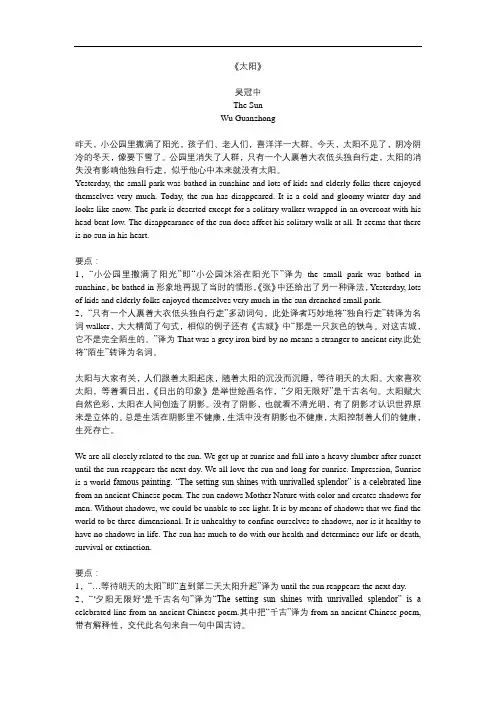
《太阳》吴冠中The SunWu Guanzhong昨天,小公园里撒满了阳光,孩子们、老人们,喜洋洋一大群。
今天,太阳不见了,阴冷阴冷的冬天,像要下雪了。
公园里消失了人群,只有一个人裹着大衣低头独自行走,太阳的消失没有影响他独自行走,似乎他心中本来就没有太阳。
Yesterday, the small park was bathed in sunshine and lots of kids and elderly folks there enjoyed themselves very much. Today, the sun has disappeared. It is a cold and gloomy winter day and looks like snow. The park is deserted except for a solitary walker wrapped in an overcoat with his head bent low. The disappearance of the sun does affect his solitary walk at all. It seems that there is no sun in his heart.要点:1,“小公园里撒满了阳光”即“小公园沐浴在阳光下”译为the small park was bathed in sunshine,be bathed in形象地再现了当时的情形,《张》中还给出了另一种译法,Yesterday, lots of kids and elderly folks enjoyed themselves very much in the sun drenched small park.2,“只有一个人裹着大衣低头独自行走”多动词句,此处译者巧妙地将“独自行走”转译为名词walker,大大精简了句式,相似的例子还有《古城》中“那是一只灰色的铁鸟。
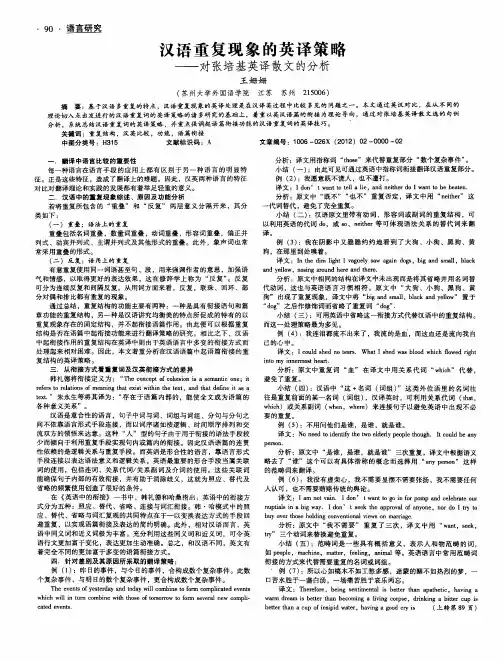
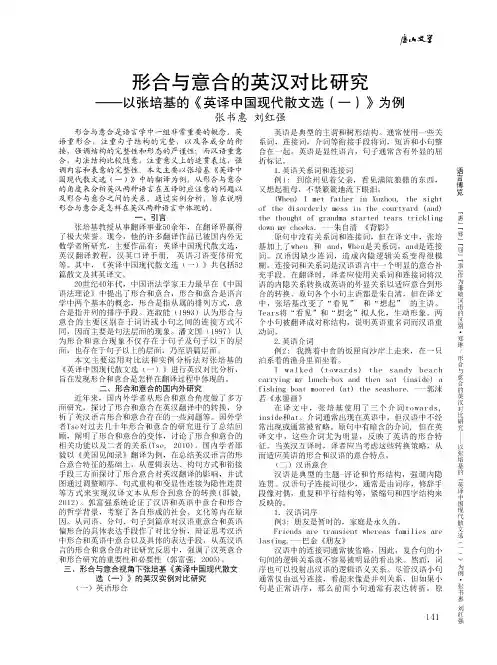

落花生我们屋后有半亩隙地。
母亲说,“让它荒芜着怪可惜,既然你们那么爱吃花生,就辟来做花生园罢。
”我们几姊弟和几个小丫头都很喜欢——买种的买种,动土的动土,灌园的灌园;过不了几个月,居然收获了!妈妈说:“今晚我们可以做一个收获节,也请你们爹爹来尝尝我们底新花生,如何?”我们都答应了。
母亲把花生做成好几样的食品,还吩咐这节期要在园里底茅亭举行。
那晚上底天色不太好,可是爹爹也到来,实在很难得!爹爹说:“你们爱吃花生么?”我们都争着答应:“爱!”“谁能把花生底好处说出来?”姊姊说:“花生底气味很美。
”哥哥说:“花生可以制油。
”我说:“无论何等人都可以用贱价买它来吃;都喜欢吃它。
这就是它的好处。
”爹爹说:“花生底用处固然很多;但有一样是很可贵的。
这小小的豆不像那好看的苹果、桃子、石榴,把它们底果实悬在枝上,鲜红嫩绿的颜色,令人一望而发生羡慕的心。
它只把果子埋在地底,等到成熟,才容人把它挖出来。
你们偶然看见一棵花生瑟缩地长在地上,不能立刻辨出它有没有果实,非得等到你接触它才能知道。
”我们都说:“是的。
”母亲也点头。
爹爹接下去说:“所以你们要像花生,因为它是有用的,不是伟大、好看的东西。
”我说:“那么,人要做有用的人,不要做伟大、体面的人了。
”爹爹说:“这是我对于你们的希望。
”我们谈到夜阑才散,所以花生食品虽然没有了,然而父亲底话现在还印在我心版上。
【译文】译文1为张培基译,选自张培基译注,1999年,《英译中国现代散文选》(汉英对照),上海:上海外语教育出版社。
PeanutsBehind our house there lay half a mu of vacant land. Mother said, "It's a pity to let it lie waste. Since you all like to eat peanuts so much, why not have them planted here. " That exhilarated us children and our servant girls as well, and soon we started buying seeds , ploughing the land and watering the plants . We gathered in a good harvest just after a couple of months !Mother said, "How about giving a party this evening to celebrate the harvest and invite your Daddy to have a taste of our newly-harvested peanuts?" We all agreed.Mother made quite a few varieties of goodies out of the peanuts, and told us that the party would be held in the thatched pavilion on the peanut plot.It looked like rain that evening, yet, to our great joy, Father came nevertheless."Do you like peanuts?" asked Father."Yes, we do! " We vied in giving the answer."Which of you could name the good things in peanuts?""Peanuts taste good , " said my elder sister."Peanuts produce edible oil, " said my elder brother."Peanuts are so cheap, " said I, "that anyone can afford to eat them. Peanuts are everyone's favourite . That's why we call peanuts good. ""It's true that peanuts have many uses, " said Father, "but they're most beloved in one respect. Unlike nice-looking apple, peaches and pomegranates, which hang their fruit on branchesand win people's instant admiration with their brilliant colours, tiny little peanuts bury themselves underground and remain unearthed until they're ripe . When you come upon a peanut plant lying curled up on the ground, you can never immediately tell whether or not it bears any nuts until you touch them. ""That's true," we said in unison. Mother also nodded. "So you must take after peanuts," Father continued , " because they're useful though not great and nice-looking. ""Then you mean one should be useful rather than great and nice-looking, " I said ."That's what I expect of you, " Father concluded .We kept chatting until the party broke up late at night. Today, though nothing is left of the goodi es made of peanuts, Father’s words remain engraved in my mind.译文2为刘士聪译,选自乔萍、翟淑蓉、宋洪玮编著,1999年,《散文佳作108篇》(汉英/英汉对照),南京:译林出版社。
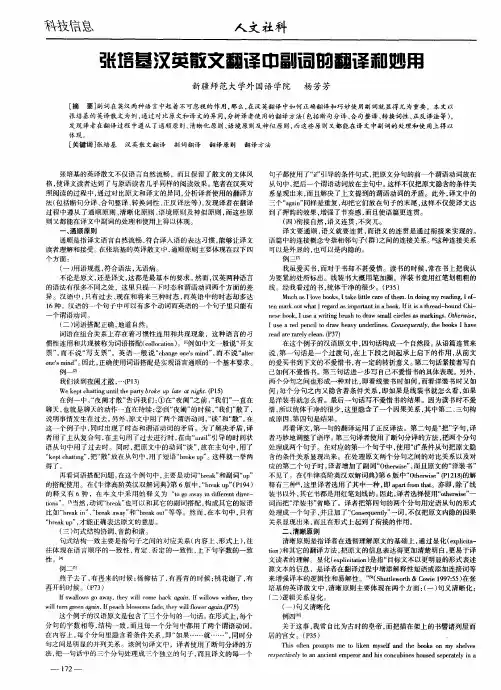
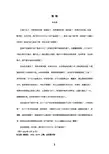
匆匆朱自清[1]燕子去了,有再来的时候;杨柳枯了,有再青的时候;桃花谢了,有再开的时候。
但是,聪明的,你告诉我,我们的日子为什么一去不复返呢?——是有人偷了他们罢:那是谁?又藏在何处呢?是他们自己逃走了罢:现在又到了那里呢?[2]我不知道他们给了我多少日子;但我的手确乎是渐渐空虚了。
在默默里算着,八千多日子已经从我手中溜去;像针尖上一滴水滴在大海里,我的日子滴在时间的流里,没有声音,也没有影子。
我不禁头涔涔而泪潸潸了。
[3]去的尽管去了,来的尽管来着;去来的中间,又怎样地匆匆呢?早上我起来的时候,小屋里射进两三方斜斜的太阳。
太阳他有脚啊,轻轻悄悄地挪移了;我也茫茫然跟着旋转。
于是——洗手的时候,日子从水盆里过去;吃饭的时候,日子从饭碗里过去;默默时,便从凝然的双眼前过去。
我觉察他去的匆匆了,伸出手遮挽时,他又从遮挽着的手边过去,天黑时,我躺在床上,他便伶伶俐俐地从我身上跨过,从我脚边飞去了。
等我睁开眼和太阳再见,这算又溜走了一日。
我掩着面叹息。
但是新来的日子的影儿又开始在叹息里闪过了。
[4]在逃去如飞的日子里,在千门万户的世界里的我能做些什么呢?只有徘徊罢了,只有匆匆罢了;在八千多日的匆匆里,除徘徊外,又剩些什么呢?过去的日子如轻烟,被微风吹散了,如薄雾,被初阳蒸融了;我留着些什么痕迹呢?我何曾留着像游丝样的痕迹呢?我赤裸裸来到这世界,转眼间也将赤裸裸的回去罢?但不能平的,为什么偏要白白走这一遭啊?[5]你聪明的,告诉我,我们的日子为什么一去不复返呢?(写于1922年3月18日)朱自清《踪迹》,1924:68-70 上海:亚东图书馆【译文一】Haste[1] The swallows may go, but they will return another day; the willows may wither, but they will turn green again; the peach blossoms may fade and fall, but they will bloom again. Y ou who are wiser than I, tell me, then: why is it that the days, once gone, never again return? Are they stolen by someone? Then, by whom? And where are they hidden? Or do they run away by themselves? Then, where are they now?[2] I do not know how many days I’ve been given, yet slowly but surely my supply is diminishing. Counting silently to myself, I can see that more than 8,000 of them have already slipped through my fingers, each like a drop of water on the head of a pin, falling into the ocean. My days are disappearing into the stream of time, noiselessly and without a trace; uncontrollably, my sweat and tears stream down.[3] What’s gone is gone, and what is coming cannot be halted. From what is gone to what is yet to come, why must it pass so quickly? In the morning when I get up there are two or three rays of sunlight slanting into my small room. The sun, does it have feet? Stealthily it moves along, as I too, unknowingly, follow its progress. Then as I wash up the day passes through my washbasin, and at breakfast through my rice bowl. When I am standing still and quiet my eyes carefully follow its progress past me. I can sense that it is hurrying along, and when I stretch out my hands to cover and hold it, it soon emerges from under my hands and moves along. At night, as I lie on my bed, agilely it strides across my body and flies past my feet. And when I open my eyes to greet the sun again, another day has slipped by. I bury my face in my hands and heave a sigh. But the shadow of the new day begins darting by, even in the midst of my sighing.[4] During these fleeting days what can I, only one among so many, accomplish? Nothing more than to pace irresolutely, nothing more than to hurry along. In these more than 8,000 days of hurrying what have I to show but some irresolute wanderings? The days that are gone are like smoke that has been dissipated by a breeze, like thin mists that have been burned off under the onslaught of the morning sun. What mark will I leave behind? Will the trace I leave behind be so much as a gossamer thread? Naked I came into this world, and in a twinkling still naked I will leave it. But what I cannot accept is: why shouldI make this journey in vain?[5] Y ou who are wiser than I, please tell me why it is that once gone, our days never return. (481 words)(Translated by Howard Goldblatt. Lau & Goldblatt, 1995: 625-626) (Translated by Howard Goldblatt. Joseph S. M. Lau & Howard Goldblatt (eds.). The Columbia Anthology of Modern Chinese Literature. New Y ork: Columbia University Press, 1995: 625-626)【译者简介】Howard Goldblatt, Research Professor of Chinese at the University of Notre Dame, USA., has taught modern Chinese literature and culture for more than a quarter of a century. He obtained his BA from Long Beach State College in 1961, MA from San Francisco State University in 1971, and PhD from Indiana University in 1974. As the foremost translator of modern and contemporary Chinese literature in the West, he has published English translations of over 40 volumes of Chinese fiction in translation to his name, including Mo Y an’s Red Sorghum, as well as several memoirs and a volume of poetry in translation. Goldblatt was awarded the Translation Center Robert Payne A ward (1985) and “Translation of the Y ear”(1999) given by the American Translators Association. He is also the founder and editor of the scholarly journal Modern Chinese Literature, and has contributed essays and articles to The W ashington Post, The Times of London, TIME Magazine,W orld Literature T oday, and The Los Angeles Times.【译文二】Transient Days[1] If swallows go away, they will come back again. If willows wither, they will turn green again. If peach blossoms fade, they will flower again. But, tell me, you the wise, why should our days go by never to return? Perhaps they have been stolen by someone. But who could it be and where could he hide them? Perhaps they have just run away by themselves. But where could they be at the present moment?[2] I don’t know how many days I am entitled to altogether, but my quota of them is und oubtedly wearing away. Counting up silently, I find that more than 8,000 days have already slipped away through my fingers. Like a drop of water falling off a needle point into the ocean, my days are quietly dripping into the stream of time without leaving a trace. At the thought of this, sweat oozes from my forehead and tears trickle down my cheeks.[3] What is gone is gone, what is to come keeps coming. How swift is the transition in between! WhenI get up in the morning, the slanting sun casts two or three squarish patches of light into my small room. The sun has feet too, edging away softly and stealthily. And, without knowing it, I am already caught in its revolution. Thus the day flows away through the sink when I wash my hands; vanishes in the rice bowl when I have my meal; passes away quietly before the fixed gaze of my eyes when I am lost in reverie.A ware of its fleeting presence, I reach out for it only to find it brushing past my outstretched hands. In the evening, when I lie on my bed, it nimbly strides over my body and flits past my feet. By the time when I open my eyes to meet the sun again, another day is already gone. I heave a sigh, my head buried in my hands. But, in the midst of my sighs, a new day is flashing past.[4] Living in this world with its fleeting days and teeming millions, what can I do but waver and wander and live a transient life? What have I been doing during the 8,000 fleeting days except wavering and wandering? The bygone days, like wisps of smoke, have been dispersed by gentle winds, and, like thin mists, have been evaporated by the rising sun. What traces have I left behind? No, nothing, not even gossamer-like traces. I have come to this world stark naked, and in the twinkling of an eye, I am to go back as stark naked as ever. However, I am taking it very much to heart: why should I be made to pass through this world for nothing at all?[5] O you the wise, would you tell me please: why should our days go by never to return? (475 words)(张培基译,1999:75-77) (张培基译,《英译中国现代散文选(汉、英对照)》,上海:上海外语教育出版社,1999:75-77)【译者简介】张培基,毕业于上海圣约翰大学英文系,曾任《上海自由西报》英文记者、《中国评论周报》(英文)特约撰稿人,后赴日本东京远东国际军事法庭任英语翻译,于美国印地安纳大学英国文学系肄业后回国。

【新祥旭考研】如何利用张培基《英译中国现代散文选》快速提高翻译水平考研学子辛苦啦!新祥旭考研的老师为大家准备了各大高校的考研资料,方便高校学子使用。
望大家参考分享认真备考。
这是我在短暂的考研复习时间里总结出的快速提高翻译水平的方法,练习材料是大家都知道的张培基的《英译中国现代散文选》。
很多同学都知道张培基的《英译中国现代散文选》是练习汉译英的绝好书籍,可到底怎么来用这套书却不是每一个同学都知道的。
大多数同学都采取先自己翻译然后对照范文的方法。
这种方法并不错,但要真正行之有效,关键在于对比过后的反思和总结。
很多同学对比完之后,并不能充分理解范文的优胜之处,或即使理解了,并不能变成自己的东西,下次还是按自己原来的套路去翻译。
这样的练习不如不做。
我们做一篇翻译就要有一篇的收获,而这个收获关键在于对比范文之后的反思和总结。
本人在备考初期,也是先自己翻译后对比范文,看过就扔一边儿了。
后来再翻译之前的东西时,发现自己还是没有多少进步。
认真反思之后,发现自己缺少对范文的透彻理解。
于是我花费了很多心思在研究范文上,并把范文的每一个短语每一个句型每一个用法,都一一查阅,弄明白它们的详细用法,并记录在笔记本及书上。
时时翻阅,以便记忆。
后来再翻译之前的文章,看着中文,那些总结的翻译知识点就一一浮现在脑海中,基本上能够再现范文。
我复习翻译的时间很短,但因为方法得当,还是取得了不错的成绩。
在这里,我把自己学习翻译的具体步骤写下来,跟大家分享,希望能够帮助同学们在翻译中取得不错的成绩!第一,依照范文,逐字逐句考察,只要是有价值的翻译点,都一一按顺序记录在笔记本上,并根据相应顺序在范文上标出数字,以便能够快速便捷的在原文中找出该翻译点。
第二,对范文中出现的短语、生僻单词等,我都会在笔记本中对其进行详细阐述,包括中文解释、双语例句等。
对于有多种用法的短语,我也会列出最常用用法,并配以例句。
只有这样,在学习中才会举一反三,全方位掌握这些翻译点。
Vol.19No.14引言张培基是中国著名翻译家、教授,28岁时便在北京外文出版社从事编译工作,一生译出了无数经典译作,为中外文化交流作出了很大贡献,也给其他译者提供了很好的借鉴。
他译注的《英译中国现代散文选》收录其翻译生涯中的经典译作,让读者大饱眼福,也让译者深受启发。
本文以张培基的《英译中国现代散文选(一)》为研究对象,探讨如何在翻译中国散文时感受、传递和创造美,旨在为译者提供一个更广阔的翻译视角,启发翻译爱好者的翻译创造力,不断增强其文化自信,促使其译出更多、更好的作品,从而使中国文化更好地走出去。
一、翻译美学及许渊冲的“三美”翻译思想(一)从美学到翻译美学对美学的定义是美学的最大难题。
美学一词来源于希腊语,意为“对感官的感受”。
苏格拉底(Socrates,469B.C.—399B.C.)及诡辩家希庇亚斯(Hippias,460B.C.—399B.C.)曾就美学一词的定义进行过一次激烈的辩论,仍未能定义何为“美”。
最后,苏格拉底无可奈何地说,“美是难的”(董广杰等2011:12)。
被誉为“美学之父”的亚历山大·鲍姆加登(Alexander Baumgarten,1714—1762)是第一位使美学成为一门学科并将其定义为“对好坏的评判”的学者(毛荣贵2005:1)。
18世纪,实验美学在欧洲兴起,其宗旨是在具体事物中发现美的本质再寻找普遍标准来定义美,而此后欧洲大陆学者将美学定义为人们的某种需要被满足之后产生的愉悦感受,即对美的真实且自然的情感流露(董广杰等2011:20-21)。
在哲学视角下,美能使人感知欢乐、满足等情感。
古罗马时期西塞罗(Marcus Tullius Cicero,106B.C.—43B.C.)主张“辞章之美”,泰特勒提出“忠实之美”等(蒋雯倩2018:73),它是人们找寻愉悦的反射,是抽象的、实在的,可以被发现、被概括。
与西方美学有所不同,中国美学关注的是主体性审美实践,注重意象的表现形式,不太关注微观透视(刘宓庆2005:79-80)。
张培基英译现代散文选11. Phrasal Expression & Words… amid(st) thunderous applause a bare subsistence A be characteristic of B = B be characterized by A A bend in a river / mountain A blind alley A brass drum 小铜鼓 A bygone age a clot of blood A cobbled path A confused mass of… A faint scent of A forgone conclusion 预料中的必然结局 A hired hand on contract A jumble of… 一大堆 A keen sense of A long-timer of Beijing A loose community of smaller family A man of profound learning A mere drop in the ocean A niche in the temple of fame A passing glance A philosophical approach to life a positive outcome A scene of poetic charm A sensation of blissfulness A speck of mud A stone’s throw A trace / shade / tint/ sprinkle of… A Treasury of Best Chinese Prose 古文观止 A vast tract of land A virtuous man / a man of supreme virtue / moral integrity A widening expanse of water abandon … to fate Ache/agonize with pain Adjoining room admire sb for sth affected 做作 aim high amiable by nature Amuse oneself by… = do … for fun Amusing episode an enlightened king An odd-jobberAn opportune moment 合适时机Ancestral homeApproach senilityaptly 恰如其分地Art troupe 文工团At a stretch/sittingAt one’s commandat the present moment Avaricious desires 贪念 Bark up the wrong tree 攻击错了目标 bashful Bask in the sunshine Be ablaze/aglow with light be advanced in years be an encumbrance to… Be beset/troubled with/by Be blurred by… Be bogged down = be trapped Be bound up with…密切关联 be central/indispensable to sb. Be cooped up = be caged be deeply grieved to learn of… be distinguished by Be engrossed in… Be exquisite and nicely arranged be forever cherished / treasured Be hale and hearty 矍铄的;老当益壮的 Be havened from be humanly impossible Be imprinted/carved/engraved/ingrained on/upon… be in a fix Be instrumental in Be interwoven with 交织着 be irrelevant / foreign to Be keenly aware of be keyed up 紧张 Be led by the nose be of southern breed Be off and on be on an equal footing with… Be on the lips of…在…中流传 Be on the minds of..be out to do…be overgrown with wild woodsbe packed with…Be plagued = annoyed = upsetBe possessedBe possessed ofbe reconciled to…be reduced tobe saddled with 负担着 be sent to gallows Be short of/devoid of Be shrouded in = be covered in = be enveloped in Be sloppy in thinking Be strewn/covered/festooned with… Be stumped by = baffled Be tantamount to…= equal Be tinted / colored by… Be troubled / seized with… Be tucked away in… Be weaned 断奶 Be weighed down/ troubled with be wet with perspiration/… Be wide of / far from the mark 离谱 Be wild with excitement / joy Be wor thy of… 无愧于 Beam = a big smile on face Bear a thin coating of… begin by degrees 逐渐开始 Beguile = while / idle / fritter away Bibliomania bicker Birds of a feather flock together Blackout: (战时)灯火管制 Blurt 脱口而出 bookish / pedantic / impractical view Border sth on the west boudoir 闺房 Bountiful free gifts Bow down to Brazenly claim / credit 厚颜无耻邀功 Break into uncontrolled sobs Brilliant talent burst with vitality Bury the hatchet Button up clothes By dint of 凭借 Capon Carcass: slaughtered animal for food Cavernous mouth Chant ancient Chinese books 诵读古籍 chicken-and-egg 因果难断的 Chit chitchat 谈天说地;灌水区(论坛版块名)Click away the secondsCome dimly into sightCome out exceedingly wellCome to pass 出现,发生Come up againstCome upon a windfallCome/be of ageConfirmed = habitualConfirmed = habitualCongenial disposition 天性convulsive sobcool one’s heelCordiallycotton-padded gown 棉衣Court ladies = palace maidCrackling: sound made by burning woodCrane one’s necks Credit A with B = attribute B to A Crumble into dust Curl up curtly = rudely Cut down on = economize on decadent 颓废的 Decorated archway 牌楼 degeneration of public morality Deliberately make a mystery of… depart one’s life Develop a liking for … diehard 顽固分子stalwart Dignitary dingy = dark + dirty Discontinuation of heartbeat disheveled hair Dispel darkness dissipate one’s fatigue Dizzy = giddy Do … a / an + adj + justice Do one’s bit Do sb a good turn Do.. by instinct dog-tired 筋疲力尽 double sure = fully convinced Drab = dull, boring, monotonous Drag on : (neg.) last Drain one’s teardrops / blood Draw an analogy between A and B Drawn-out = prolonged dream = longing = aspiration 憧憬 Dwell on dwindle away Eat into… Eat with gusto 津津有味地吃 edge away 慢慢离开 eke out a living 勉强度日 Elegiac Address to My Nephew Shi’erlang 祭祀十二郎文 Emaciated = fragile Embellishment 点缀 Empty into 注入,流入 Enormously magnificent / generous Entertain ambition Every hook and cranny 每个角落 Exemplary 模范的 Expanses of vacancy Extol 称赞 Fall through = bubble = be disillusioned Falteringly 结巴地 Family rules of good behavior Fare likewise Fascinating=imposing =peerless=breath-taking fawn on / flatter / toady to Feebly Fickle man 薄情男子 Fierce-browed Fighting scene First-hand experience Flagstone flower cultivation Follow one’s bent/inclination/will for one’s part 就某人而言 Forsaken roses Frame/state of mind Frolic 嬉闹,玩耍 Frostbitten fruits of labor Gain access to Gentle gracefulness Gesticulate = gesture Get up to mischief Get wind of… Gloomy sternness gloomy sternness Gnaw at sb = afflict / torture sb go out of one’s way 特地 Go out to…(be emo tionally drawn to) Go soldiering 军旅生涯 go through the wringer 历尽幸苦 God of Longevity Grove 树林,果园 Grow by/in leaps and bounds grow in luxuriance Grow in rich abundance Guileless 老实的,不奸诈 Hang on to one’s presence 不肯离开 hardier species Harp on Harp on 唠叨 have … to one’s name = be in one’s possession Have attachment for … Have blind faith in… Have designs on… Have no claim to… 对…无拥有权 Have nothing to live on hawk one’s wares Heart-rending = grievous Heavenly abode Herculean strength Hoary-headed 头发花白 Hoodwink = cajole household chores humor editors 应付编辑 I find them all. 尽收眼底 Impassioned speech / essay In all earnest 再三,尽力,竭力 In anticipation of In defense of…= in one’s defense in every way 彻头彻尾 in line with 符合 In spite of oneself 不由自主In the boom / prime of youth In the morning haze In the prime of life In unisonInadvertently 无意间 indomitable = steadfastingratiate sb with…= toady to sb ingratiate 讨好 Inkling = hintIn-laws n. 姻亲(无血缘关系的亲戚) Inspiration gushes 灵感涌动 /comes gushing to one’s mind. Intermittently = continually InwardlyIrreparable loss Jeer at 奚落 jeering voice Jujube tree 枣树Jump down one’s throat 猛地回击 keep a wary eye Keep early hoursKeep one’s body and soul together Keep up appearances Kitchen-maidKnack of farming 劳作技能 LabyrinthLack of propriety = impropriety Lackluster 单调的Lament with a deep sighLanguid = lethargic = sluggish Laud sb to the sky lavish attention on lazybones Lie wasteLie/remain unknown Liken / compare sb to … Limpid brook Listless 无精打采 Literati 文人学士 Locust tree 槐树Longing note 杜鹃啼血 look askance at 斜视Look over one’s shoulder loving/fond memoriesMake a clean break with… Make a fanfare Make for … 有助于 Make light of 无视 malicious squint malingerman of letters mandarin jacket mean everything Meritorious service mist-shrouded Model … after …Money-shopmoral excellenceMore dead than aliveMorning glory 牵牛花Moult one’s shellMyriads of fireflies荧光千点Mysterious lorenameless fear/atrocity/lonelinessNegotiate gorgesNext to noneNot sleep a winknuptial chamber 洞房Obsequious = flatteringOctogenarian 八十岁的人Old homeOmen预兆on sentry duty 站哨On the pretext of… 以…为借口/理由OstrichlikeOverflow with material desirepack the hallPalpable = noticeable = tangibleParting sorrowPass for = be regarded asPass out of existencepeaceful calmnesspendant 坠饰People of all strataPerennially youngPersonal inclinationPersonal liking = preferenceperspire / blood profuselyPerusal熟读of sthPet phrasepetticoat influence = nepotismpigstyPit – a – pat = pitter – patteringPitch-darknessPlay up to = fawn on bigwigspleasure of lifePly sb with sth 不断供应Pounce on… 猛地扑向Prostrate oneself 顺重Prowl 潜行Puddles of rainwater雨水坑Put sb in the mind of…Quite a few varieties of…Reddening glow of setting sunReedRefrain from…Reign supreme 占优势Render a service to…贡献respect = reverent = well-mannered Reverberating bellRhapsody on E’pang Palace 阿房宫赋rosary 念珠Royal edict Rubble 碎石Rules and regulationssafe haven = soft / peaceful shelterSallow 蜡黄,灰黄Sapphire mountains and emerald riverssave up forsb grow out o f … 长大Scarlet cloudscheme against each otherScrape along/by艰难度日Scurry/hasten homewardssedan-chairSee the light of day 出版问世Seek a livingseek solaceSentimental value 纪念价值Servant girlSet one’s mind on sth/ to do sthShadow boxingshed tears over…shoulder pole 扁担Shout / yell one’s head offShrug off one’s words = distrustShy away from…= avoid…Sicken to seesidelong glancesideway growthSign with regretSit bolt uprightSize sb upSleep on/oversmart alecksnatch awaySocial strataSodden 浸湿的Sound trailed off.Sparkling starSpeak volubly 口若悬河Spell disasterSpell disasterspin cotton into yarn 纺纱Spring drizzle毛毛雨Spur oneself onStand to benefit in … 可能/将会有利于Starry= star-studded= a constellation of performers andartistsStereotyped essaySth be ingrained 根深蒂固sth be written all over one’s faceStrengthen/toughen/brace up one’sspiritsstride over / brush / whiz / flit pastStroke the scar / chinSuperb attractionsupercilious 高傲的supplicate 恳求Supreme duty 最大责任swagger 昂首阔步走sweat streams down face.T adpoleT ake … at face value 只看表面take … very much to heart把…很放在心上T ake sb to task= severely reproach/reprimand sbtake to sth/doingtaste of = look likeT attered clothesTear itself away fromTemple太阳穴,鬓角That’s final.the asking price 要价The hooting of an owlThe long night wore onamid(st) its dripping sound.The sea of mortals = the livingThere’s no limit to learning.Thinning hairTime and money he had noneTo complicate matters= to worsen the situationTo one’s heart’s contentto the effect that… 大意是To the neglect of meals and sleepTo the tune of…touch off = sparkTower to the skyTram 有轨电车Treat sb/sth to… 让某人享受…Tricolor 法国三色国旗Tumultuous = turbulentTurbid, sordid, corpulentTwig 树枝twine and climb 盘旋而上Twinkle / sparkle w ith…Twist and turnUmbilical cord 脐带unbosom oneselfUnder one’s wing / protectionUndiminished= remain strong = not recedingUnflinchinglyUnkempt = untidyunruffled = calm = placidunsettled lifeUnshirkable responsibilityUsurp the throneUtter/let out a soundVenerable Guovenomous = maliciousverandaVermin = harmful people / objectVie in doing sthwane = pine away = wear away Wayside flower 路边野花Waywardness 任性Wear an air of casual indifference Wear and tear of timeWeeping willow Well up(感情)迸发Wheat in the ear 芒种whetstone 磨刀石Whimper = sobWhims and desires 奇思幻想white poplar 白杨Wide erudition 博学Wind up staying…With no strings attachedWither away in solitude 在孤寂中凋零Without a soul in sightwryly = ironically2.SentenceA feeling of forlornness will begin to creep up on you.A glimmer of light filters into …A keen / biting/ stinging / cutting / savage satireA life free from worries and caresA matter of survival or extinctionA soldier knows no compromise.As fresh as ever in my memoryAs smooth as a mirror道滑如拭Be beside oneself / overwhelmed with joy / rageBe entranced / attracted / enthralled / enticedBe fraught with (dreams/concerns)Be more than eager to do…Be reserved and content to live in obscurityBe worthy of remembranceBring… into closer contact with…Convey one’s regards to…Cries gradually recede from hearing.discredit / disgrace sb in publicDrink nonstop to…= propose repeated toastsEndure countless hardshipsGraduate with honorsHarbor/have an enmity against…Hardly be able to escape censureHave sth to recommend itself 总是好的He never made enough money.His debts mounted with each passing year.how many days I’ve got = I’m entitled toI feel duty-bound to… = I feel it incumbent on me to…It filled me with much concern to learn of your indisposition.Lapse into sympathetic silenceMake a still better place of…Merge into a harmonious wholemuffledMy heart was tramping / racing / pounding.My heart’s throbbing with gratitude.nocturnal merry-making under candle-lightsRegister/record the days of youthrelive old days/timesSee through the vanity of human societyThe choice is yours / lies in you.There reigns peace and quietness.There’s no denying the fact that…There’s nothing but stillness there.A strip of water should have become so vast a distance=keep us poles apartBe representative/typical/symbolic/emblematic/quintessential of…Climb (up) the social ladder = rise to power and positionFulfill the task imposed on you and your father by historyIf I were the sea-tide, I’d marshal rolling waves to cleanse the beach of all accumulated filth. Lots of things are apt to fade away as one’s life experience accumulatesPlunge/throw/thrust/thrash the house into deep darknessthe greatest / best … that ever breathed since tim e immemorialWith/have a slight touch/portion/shade/trace/tint of regret 微叹张培基英译现代散文选2 1.Phrasal Expression & Wordsa blade of grassA chill in the airA constellation of fine arts异彩纷呈a grain of sanda later invention/practiceA propensity for …a red streak of dawn 一道红霞a string of cash 一吊钱a suckling baby 乳儿A tremulous voice 颤抖的声音A vast expanse of whiteAbandon oneself to…= be lost in…Absence of any feelingadd … in passing 顺便说道ajar 门半开All the more = moreAlley = alleywaysAmble alongamphitheaterAnti-Japanese Guerrilla Detachment 抗日游击队arrive on the sceneArtifice 诡计At an opportune moment 碰巧at long last 终于At one go = in one sittingAt one’s insistenceAt the suggestion of …awning 遮阳蓬base cowardice 卑怯bayonet 刺刀Be ablaze with… 通明be adequately fed and clad 丰衣足食be at loggerheads with… 与…斗争/不合be bereft of … = be deprived of…Be bogged down in a mire 陷入泥淖Be clad in…be confined to bed by sicknessbe daubed with… 散漫地涂有Be given to doing 习惯于be immensely overjoyed 欣喜若狂Be of long standing 老资格B e on an equal footing with… 与…平起平坐be on/at one’s heels 紧跟着Be ordained by fateBe overgrown with grassBe pleasant to the ear: 悦耳动听Be pregnant with meaningBe shrouded / veiled in… 笼罩在Be sloppy in thinkingBe subject to the law of natureBe thoroughly drenched / soakedBe uncalled for 不合适begrudge doing = be unwilling to doBemoan the transience of youthBest serve for an answerblood debt(s) 血债Blot out 抹去Boundless expanseBring about a … moodBroad and liberal 胸径宽广bronchial tube 支气管Burst into fits of abuseBuzz with activity 活跃起来by and largecadence 抑扬顿挫Call forth tears = trigger tearscanine phobia 怕狗Canvass (for) support 游说以获得支持cessationChalk up… 用粉笔写下chant Buddhist scriptureChestnut: 栗树/子Chin up and chest out 抬头挺胸Choke with sobschorus of wild yellsClog 阻碍,木屐Cluck 咯咯叫Come of = result fromCome to the fore 崭露头角Congenial response 共鸣consult sb on …Consummate = skillful = perfectCopious tears of joyCrestfallen = dejectedcringe = cowerDabble in water 戏水Damp down one’s passionday in and outdazzling brilliance 炫目/夺目的光辉Deadly dull 极其乏味Delicate features 纤细的面貌Denude trees of leavesdespotic 专制的detachment 小分队Diehard 顽固分子Din = hubbub: loud soundDine and wineDomineering 专横的Downy: fluffy + softDream away = dawdle awaydrool copiously 垂涎三尺Drudge 苦工,辛苦劳作drudgery 苦差Dwell one’s eyes on… 凝视dye… red 染红Eatery 餐饮店Ebony eyes/skin 黑眼睛/黝黑皮肤Edible bird’s nest 燕窝End up in a complete fiasco 惨败Enfeeble = weakenepithet 绰号Ethereal 超凡的,优雅的Failing = if withoutFalcon 鹰隼(sun)feel conscience-strickenFeel instantly refreshed 顿时神清气爽feel overawed 肃然起敬Fellow provincial 老乡firmament 苍穹get a good thrashingGet on in years 上年纪Get the worst of it 处于劣势Gild… 使…金子般发光give sb. the slip 把某人甩掉glazed tile 琉璃瓦gloss over 掩饰glower 怒视gobble up 狼吞虎咽Good wishes = blessing = auspicious remarkGood-for-nothing = lazybonesgosling 小鹅,没经验的年轻人grizzled feather 灰白的羽毛Hanker after 渴望Happen by mere coincidenceharbor/bear hatred/grudge/against…Haughty 高傲的Have the audacity to do … 胆敢做Have… all to ones elf 独占…Heartening = encouraginghearty thanksHigh aspiration / ambitionHoard for speculation 囤积居奇Hold sway 控制Homing / carrier pigeonhoodwink 欺骗I wouldn’t presume 岂敢immense joyImprint 印记In a dazein expectation of…in spite of oneself 不由自主in the /at dead of night 深夜In the face of the waning sunin the twinkling of an eye 瞬息之间Inhibition 拘谨Into the bargain 而且还…irk = irritateJet black: 乌黑发亮joss stick 香Keep sb at arm’s length 保持距离keep up with the trend of timesKick sb. when he’s down 落井下石Knitted browLay… to rest 安葬,平息Limpid, insipidLinden tree 菩提树loll 懒洋洋地依靠luminous 发光的Lush greenery 草木青青Lush 茂盛的Make a bungle of… 弄错man of heroic mettle 有血性的人mandarin jacket 马夫Maxim 格言Megalomania 夸大狂Merit and demeritMerry-makingMope around 闷闷不乐地闲逛Motley: 混杂的Mulish=stubbornmurky 浑浊的,昏暗的Myopia 近视not a soul in sightOld fogey 老顽固On an empty stomach 空着肚子On end 连续,接连Oriole 黄鹂out of the common 非同寻常pallor 苍白脸色Pampered / spoilt childPauper = beggarperennial youthPersimmon: 柿子Piping: 尖叫声piteous 可怜的Plaintively = mournfullyplay the fugitive / pursuer 逃/追plumage 全身羽毛Plunge sb. into gloomPoetic feeling/sentiment 诗意Polish up 润色pound away 连续打击preen 刻意打扮present a view 立论Privation 贫困Propriety 行为/举止得体或恰当Prosaic 平凡的pure and simple 不折不扣,全然put … to shame 使…黯然失色Put forth buds: 抽芽Quail: 鹌鹑Railing 栏杆Rain pelted/poured downrain-drenched 雨湿的Rank weeks: 丛生的杂草recall … to one’s mindred orb 红日Relive the old daysremnant 遗留物reticence 缄默不语retracted lips 凹陷的嘴唇retrogression in history 历史的退步rickshaw boy/man 黄包车/人力车夫Roost 鸟类栖息处run amok 发狂sanguine = optimisticscamper over 蹦蹦跳跳Scamper: 小动物/孩快蹦scholarly dignity 书生气Second self = bosom friendset pen to paperShanghailandershut… out of viewshy awaySilver dollar 银元sit idle 空坐,空等skirt around 绕开Slipshod 懒散的,随便的slushy = snow-clad, sentimentalsmugly 沾沾自喜Social development / progresssolicitude 担心somehow or other 不知怎的somersault 空翻Sparingly 慎用,节省speak volumes for … 充分说明Spick-and-span 干干净净spick-and-span 干净,清爽Spiritual barrennessSpongy fine sand 细软沙子Sprightly = energeticstage a demonstrationStalestand guardStand lost in reverieStand to do = be likely to doStandoffish 冷淡的status quoStatus quo现状Steer/keep/stay clear ofstem the tide of progressstirring = excitingStrands of silk 屡屡丝线Straw-ladenstretch far into the distance 伸向远处Strike / touch a (deep) chordStrike up a funeral hymn 奏挽歌swoop down 向下猛冲take … to one’s heels 溜掉T ame = docileT arry = lingerT auntingly = jokinglyThat’s a hard nut to crack.The clatter of mahjong tilesThe droning of machine 机器响声the endearing grandeur of nature The living presentThe rattle of sabres(军刀) Thump/throb with emotion Tip sb. a wink 使眼色touch upon = make mention of …Touch/strike a chordTransience 短暂,易逝Treasure / cherish memorytreat me like dirtTremor: 小颤动underdog 弱者Undeserved reputation 名不副实unflagging energy = energeticUnsheathe 出鞘uphold justiceusher in a new century 迎接新世纪Vent … on/onto…Verdant 翠绿色的Wait on sb伺候Waning sun 残阳Wax and waneWeigh heavily on one’s mind = bothersbwhisk sth. away/off 匆匆带走White fungus 银耳window pane 窗玻璃with gusto 兴致勃勃2.SentenceA creamy white ray streamed in.a large attendance of several thousandbe at the end of resources = exhaust all one’s wits/means/tricks 黔驴技穷Be emaciated and have a sallow face 面黄肌瘦be engraved / imprinted / etched / embedded on one’s mindBe exposed to the serenity of the elementsBe filled with sentiment = sentiment swells up in heart.be flogged by the scourge of life 受到鞭策Be next door to = stand next to = border onBe tucked away in the depth of memoryendure the torments of hunger 忍饥挨饿Ever lingering love for you despite our separation. 藕断丝连Give sb a sidelong glance over one’s glassesGlance at sb out of the corner of glassesIdentify oneself with broad mass of peopleLook earthward instead of skywardlord it over … = reign over… = resume domination over…Most apt / liable to slip away / slip through fingersMy heart palpitates with awe.Pass through life all but oncePlay ducks and drakes 水面掷石子比赛rise laboriously bit by bit 努力慢慢上升Susceptibility is always better than / preferable to insensibility. Through all lands and all eternity。
不单是诗人,就是被关闭在牢狱里的囚犯,萧索的感触来的,不但是诗人,就是被关闭在牢狱里的囚犯,到了秋天,Not only poets, even convicts in prison, I suppose, have deep sentiments in autumn in spite of themselves不由自主地In spite of oneself何尝有国别,更何尝有人种的阶级区别呢Autumn treats all humans alike,regardless of nationality, race or class.不过在中国,文字里有一个秋士的成语,读本里有着很普遍的欧阳子的秋声与苏东坡《赤壁赋》等,就觉得中国的文人和秋的关系特别深了However, judging from the Chinese idiom qiushi(autumn scholar, meaning an aged scholar grieving over frustration in his life) and the frequent selection in the textbooks of ouyangxiu’s on the autumn sough and Su Dongpo’s on the red cliff, Chinese men of letters seem to be particularly autumn-minded.可是这球的深味,尤其是中国的秋的深味,非要在北方,才感受到底But, to know the real flavor of autumn especially china’s autumn, one has to visit the North.南国之秋,当然有它的特异的地方的,比如二十四桥明月,钱塘江的秋潮,普托上的凉雾,荔枝湾的残荷等等Autumn in the south also has its unique feature such as the moon-lit Ershisi bridge in Yangzhou, the flowing sea tide at Qiantangjiang River, the mist-shrouded Putuo mountain and lotuses at the Lizhiwan Bay.可是色彩不浓,回味不永。
从张培基《英译中国现代散文选》看译者摘要:本文从译者文化身份的角度分析张培基《英译中国现代散文选》中的中国英语现象,探讨译者文化身份对翻译的影响,及译者文化身份与中国英语之间的关系。
译文在实现跨文化交际功能的过程中,译者文化身份影响中国英语的使用,同时后者又促进前者的确认,两者之间呈现相互影响,相辅相成的辨证关系。
关键词:译者文化身份;文化目的;中国英语中图分类号:g64 文献标识码:a 文章编号:1006-026x (2012)06-0000-01引言随着英语在全球的广泛使用,在不同国家形成了各类英语变体,在中国出现了中国英语。
中国现代著名翻译家张培基先生的两辑《英译中国现代散文选》为中华文化的对外输出做出了贡献,为翻译研究提供了珍贵范本。
从中我们可以看到不少中国英语的译例,本文旨在从选集译文的评析中探讨译者的文化身份与译文的语言选择之间的关系。
一、中国英语和译者文化身份1. 中国英语和中式英语中国英语(china english)不同于中式英语(chinglish):“中国英语的存在是一种现实,而不是一种假设,具有广阔的发展前景和研究价值;中国式英语是一种畸形语言现象,将随着英语的普及和中国英语使用者的‘自我审视’而逐步减少或消亡。
”(李文中,1993:24)2. 译文集的语言特点—地道英文与中国英语并存译文集中使用的中国英语,通过各种形式表现中国特色。
首先有音译手段,如朱德《母亲的回忆》一文中“衙门差役”(张培基,1999:330)译为“yamen bailiffs”,(ibid.:337)柯灵的《巷》中“乌衣巷”(ibid.:346)译为“wu yi xiang”(ibid.:350),“胡同”(ibid.:345)“hutong”(ibid.:349),郁达夫《故都的秋》中“白干”(ibid.:207)译为“kaoliang wine”(ibid.:212)。
其次使用严格直译保留原文结构和中国特色,如廖沫沙“《师说》解”中“孔子曰:三人行,则必有我师。
形合与意合:《想北平》张培基译本例析作者:史雨嘉来源:《文教资料》2018年第10期摘要:英汉话语组织结构的差异体现了两个民族的思维差异。
英语重形合而汉语重意合的现象被认为是英汉两种语言最显著的差异特征。
本文从形合和意合的角度赏析了张培基的译作《想北平》,重点讨论了译本是如何在衔接和连贯间进行转换的。
研究发现,英译本最常使用的翻译技巧是增译连接词和把并列结构转换为主从复合结构。
关键词:形合意合衔接连贯《想北平》1.引言新中国第一位“人民艺术家”,老舍的作品深受大众喜爱。
其作品语言直白、通俗、精致、鲜活。
文笔行云流水,一气呵成。
老舍的散文题材广泛,贴近民众生活。
在贫苦环境中成长的他,关注下层人民疾苦,其作品多从百姓视角描写百姓生活,抒发爱国情感。
散文《想北平》就是其代表作之一。
《想北平》一文语言质朴,结构自由开放,形散而神聚,是散文中的佳作。
但是,将该文学作品翻译成英文时,如果仍保留作品原有的松散结构,其译作的可读性就会大打折扣。
因为汉语重意合,各分句之间的联系主要靠语序和内在逻辑关系体现。
英语重形合,分句间的联系多通过外在的语法手段或者词汇手段体现。
缺乏这些衔接手段,文章则如一盘散沙。
因此,英译散文需特别关注形合与意合间的转换。
评价一篇译文应多从这方面考虑。
本文拟从形合与意合视角赏析张培基的译作Fond Memories of Peiping,探析张培基的译本是如何处理形合与意合之间的转换的。
2.形合与意合的概念界定英汉话语组织结构的差异体现了两个民族的思维差异。
中华民族几千年来深受道家、儒家和佛教的影响,强调悟性,汉语形成了重内在隐含关系,以意统形的特点。
相反,英语深受形式逻辑的影响,体现在语言上则是重逻辑语义关系外显,以形统意[1]。
形合与意合的概念在我国最早是由王力[2]提出的。
之后,刘宓庆[3]、连淑能[4]和潘文国[5]等对此都进行过论述。
纵观各家观点,对形合与意合的界定大致可以分为两派:一派认为形合与意合的区别仅仅是句子的连接方式不同,即主要表现在句法层面。
英译散文张培基【篇一:英译散文张培基】生命life何为he wei| 译文摘自张培基《英译中国散文选二》如果回归自然,各有不同的方式,后人总是尊重前人最后一次选择。
一位朋友偶然讲起一件事,有如一篇小小说,听者动容。
there are various ways of returning to nature, but people generally respect the last wish made by their parents towards their journey’s end. a friend of mine incidentally related to me the following occurrence which, like a little story, is very touching:要点:1,“前人最后一次选择”译者按”父母的临终愿望“之意译为the last wish made by their parents towards their journey’s end,其中one’s journey’s end意为“临终,生命的尽头”也可译为the last wish made by their parents towards the end of their lifejourney2, “一位朋友偶然讲起一件事”译为a friend of mine incidentally related to me the following occurrence,其中relate 意为“讲述”其同义词有recount,recourse, speak of,occurrence指“发生的事情”比thing更加高端啊有木有~3,“听者动容“即”令听者动容“或”令人动容“=touching在新开发的丛林里,一条蜿蜒的小径上,一个衣着素色的女人踽踽独行,径直走向林子里的一棵树。
这里许多树大小参差不一,有的移植不久,不过都长得很快。
在一个时期内,都挺直有神。
新生的树叶嫩绿有生机。
当然,有人专门护理这些纪念树。
in a newly opened-up forest, a quietly dressed woman walked all byherself on a winding path straight towards one of the trees. there were many trees of varying sizes, and some had justbeen transplanted, but all were shooting up fast, standing straight and stout and covered with light green young leaves. evidently, some people had been put in charge of these memorial trees.要点:1,“在新开发的丛林里,一条蜿蜒的小径上,一个衣着素色的女人踽踽独行,径直走向林子里的一棵树。
“本句虽然是四个散句,表达的却是一连串的动作,因此可以调整顺序后将其整合为” 一个衣着素色的女人独自沿着蜿蜒的小径走向一棵树“译为in a newly opened-up forest, a quietly dressed woman walked all by herself on a winding path straight towards one of the trees.2,“衣着素色的“译为a quietly dressed,此处的quiet意指”颜色素净,不显眼“;”踽踽独行“即”独自行走“=walked all by herself3,shoot up意为“上冒,喷出,猛长“=spring up,更加生动形象地表现出树木那富有生机的生长状态~是一个值得借鉴的好词,4,“有人专门护理这些纪念树“译为some people had been put in charge of these memorial trees。
此处”专门护理“宜理解为”专门负责照顾这些树“,也可译为some person had been specially assigned to take good care of the memorial trees综述:类似于shoot up这种生动形象的词我们之前也见过不少,比如put forth, sprout up/out~不知多少年来,这个女人总是带着一束鲜花默默地置于树根旁,然后仰起头来,对着树身凝视,翕动着她独有的小小嘴唇,既像独语,又像倾诉。
她退后一步,打量她这树高了多少,细心地除去树下斑斑驳驳的落叶,向这颗移植多年的树倾身拥抱,亲了一下,轻轻摩挲树皮的皱纹,如同面对一个有生命的躯体。
不久,她依依不舍的转身离去,消失在暮色渐浓的秋天最后一抹余晖里。
as she had been doing for we don’t know how many years, the woman stood silently beside the tree with a bunch of fresh flowers in her hand. she raised her head to fix her eyes on the tree and kept moving her unique small lips as if she were soliloquizingor sharing her innermost feelings with someone. she took astep back to assess how much the tree had grown in heightand softly removed the mottled fallen leaves under it. she bent forward to hug and kiss the tree that had been transplanted many years before, and gently stroked its wrinkled bark as if it were something alive. then she reluctantly turned round and left, vanishing into the last rays of an autumn day in the deepening dusk.要点:1,“不知多少年来“译为as she had been doing for we don’tknow how many years,其中we don’t know how是插入语,用以表达原文的”不知“此从句也可译为”她这样做已经许多年了“即ashad always been the case for many years或as she had been doing this for many years~在《我坐了木船》中也有类似表述——“跑了不知多少趟,总算有眉目了”译为after making you dontknow how many visits, there eventually appear signs ofpositive outcome.其中的you don’t know how也是插入语,修饰many。
2,“翕动“即”不断地张合“故译kept moving3,“依依不舍“一般都用reluctant来翻,如it the time to go back. we were fascinated by the scenery and reluctant to leave.该返回了,我们被这景色深深吸引住了,不愿离去。
综述:本段有很多文学性较强的词如“独语“”倾诉“”斑斑驳驳的“摩挲”“ 翕动”都是我们需要积累的哦~还是那句话:文学性很重要的一个体现就是在选词用词上~一阵秋风吹过,树叶沙沙地响动,仿佛隐秘的私语。
女人顿时回过身来,惟有她才能听懂私语的全部含意。
于是喃喃自语向大树告诉。
含着泪,走向她的归途。
年复一年,小径上的女人孤独的背影,显得越来越苍老了。
at a sudden gust of the autumn wind, the tree rustled like itwas whispering secretly and the woman, being the only person capable of understanding the full implications of the whisper, immediately turned round. then, after mumbling a few words to the tree, she said goodbye to it and set out on her way home with tears in her eyes.as the years went by, the woman, a regular solitary visitor on the path, became older and older.要点:1,”一阵秋风吹过“即”秋风起“或”起了一阵秋风“,故译at asudden gust of the autumn wind,其中at的含义是”由于“”作为对…的反应“2,“树叶沙沙地响动,仿佛隐秘的私语“译为the tree rustled like it was whispering secretly and the woman.”沙沙地响动“=rustle,简洁生动~拟声词在文学翻译中的作用也是应该引起重视的~3,“.惟有她才能听懂私语的全部含意“其实隐含了”因为“这层关系,因此译为being the only person capable of understanding thefull implications of the whisper4,“小径上的女人孤独的背影,显得越来越苍老了“如果直接译为”背影变得苍老“会引起外国读者的困惑,因此可以按照”常见于小径上的那个孤独女人,显得越来越苍老了“,译为the woman, a regular solitary visitor on the path, became older and older.综述:介词,拟声词,显示了译者扎实的语法功底和语言功底,惟有不断积累和运用才能成就的事业~若干年后,这棵树长得更高大了,树冠缀满葱茏的树叶。